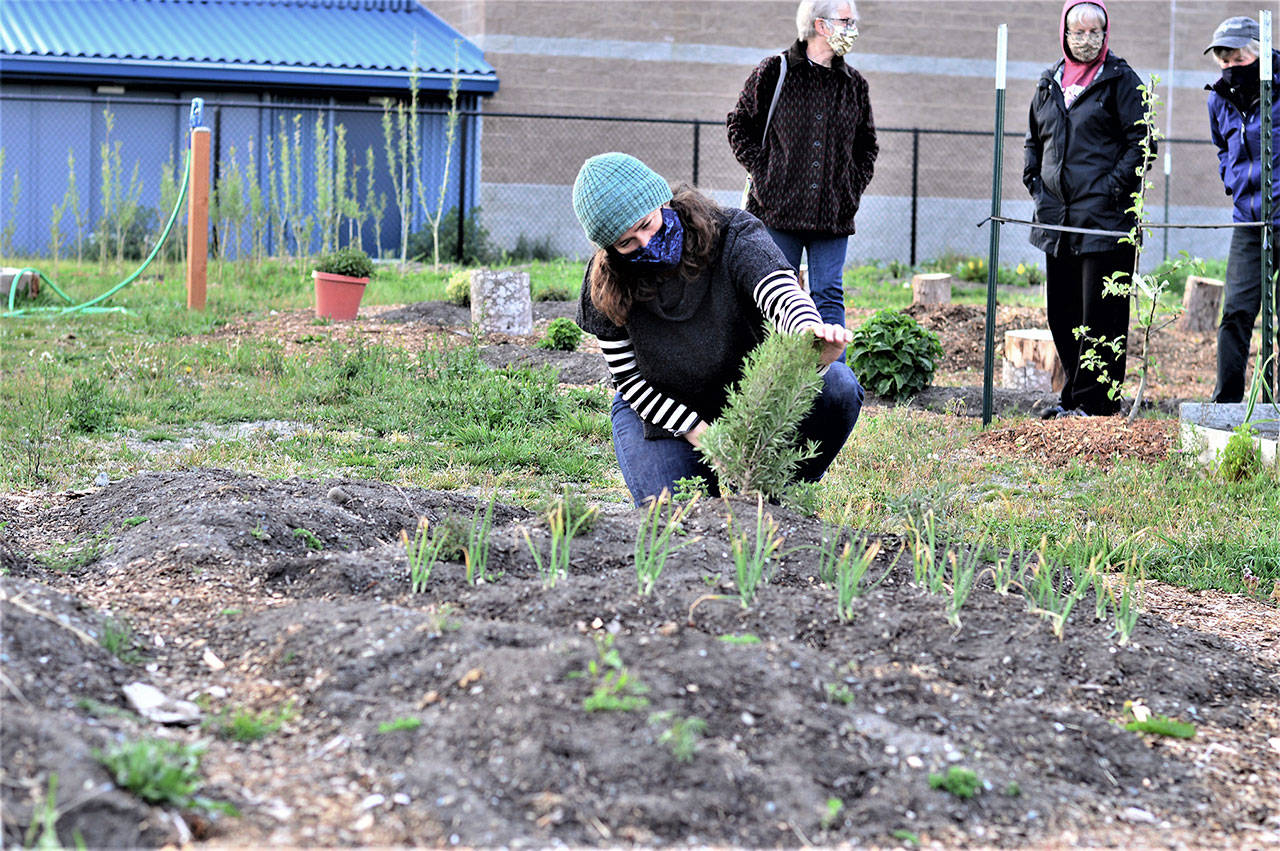CHIMACUM — This pizza garden, with its rosemary, oregano and onions, just might change a child’s future for the better.
That’s the hope fueling the Jefferson County Community Wellness Project, which has helped grow gardens on Chimacum school campuses.
Shelby Smith, a CWP board member, gave a tour of the gardens Monday evening and then explained their role in the big educational picture.
“The idea is that kids can’t learn well unless their bodies are nourished,” she said. “Creating healthy eating habits in your young life can really lay a foundation for a lifetime.”
Contrary to popular belief, Smith added, preschoolers and first- through sixth-graders delight in broccoli, carrots and kale. The key: Teaching children how they’re connected to these gardens.
“Kids are willing to eat food if they can grow it,” Smith said.
The Chimacum School District is enjoying plenty of green these days thanks to the CWP’s win of a $100,000 Farm to School grant from the U.S. Department of Agriculture.
Awarded in July 2020, the grant funded the nurturing of gardens at Chimacum Creek Primary and Chimacum Elementary schools.
With this major award, the Chimacum School District joined the Port Townsend and Quilcene school districts in developing a rich farm-to-school program, Smith said.
The gardens are grown up now — and expanded in the form of a state-of-the-art greenhouse that’s as big as, well, a house.
The CWP got a grant for it, too, from the state Office of the Superintendent of Public Instruction.
Inside the greenhouse are scores of young plants, including tomatoes and basil to be added to the pizza-garden harvest. That plot, with its pizza slice-shaped sections, is on the Chimacum Elementary School campus.
The place is a refuge, Smith said.
“In the winter, the wind really whistles through the valley. It’s good to have a warm place to come and learn,” she said of the greenhouse. The structure also measures weather conditions, providing data for science classes.
The first plant to be moved in: a fig tree, which responded right away. It spread its branches, Smith said, as though it was stretching out in the sunshine.
With the arrival of sunnier days, the garden right outside is a place teachers and their kids use as a fresh-air classroom. Just sitting in a circle, ladybugs near: It’s an antidote to all that online learning.
Back at Chimacum Creek Primary’s garden, there’s a worm bin and composting system. These are the result of a $750 grant from the Jefferson County Master Gardener Foundation, which looks every year for programs like this.
The grant is titled “Break It Down,” said foundation board member Honey Niemann, since it focused on helping students learn how composting works.
She and Master Gardeners Nita Wester, Susan Sparks and Candice Gohn joined Smith’s tour Monday night.
The Master Gardener Foundation, Niemann noted, is committed to funding projects like these, which use research-based methods and encourage environmental stewardship.
In other words, the youngsters who work in this garden discover where they fit in the cycle of life. Plant waste becomes compost; compost nourishes the soil from which vegetables and fruits grow. And all that fresh food nourishes our bodies.
“There are three themes at the center of the garden experience: cycles, connections and interdependence,” Smith said.
“Kids really tune in when they’re doing something real: growing food they can eat.”
Smith, along with garden coordinator and teacher Shanell Rosenfeld — whose 20 hours weekly are funded by the USDA grant — have contended with many obstacles since last summer.
School schedules have changed multiple times due to the state’s pandemic-era restrictions. Children eat at home instead of in the cafeteria, so they don’t get to enjoy the salad bar, which used to feature local veggies.
Yet Smith and Rosenfeld have ideas for the coming months: classroom mushroom-growing projects and summer school in the gardens are among the possibilities.
The CWP has already produced a series of “Meet Your Farmer” videos, short YouTube clips featuring Mystery Bay, Midori, Finnriver and Sequim Bee farms, One Straw Ranch and, in a “Meet Your Baker” video, Pane d’Amore.
Information about the wellness project’s activities can be found on its website, JCCWP.org.
“It’s been a super tough year to make good on all of the plans we put in place, but we’re plugging along,” Smith said.
“We want to show how the food and farm system is made up of real people, and give kids a sense of place, a sense of community.”
________
Jefferson County senior reporter Diane Urbani de la Paz can be reached at 360-417-3509 or durbanidelapaz@peninsuladailynews.com.

